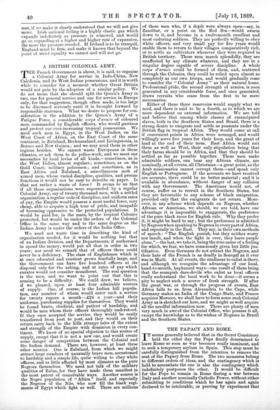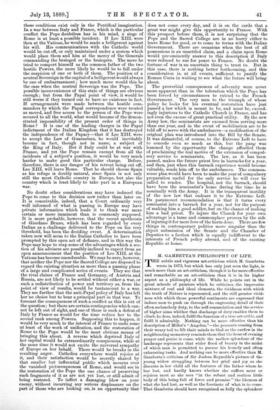THE PAPACY AND ROME.
IT seems generally believed that in the Secret Consistory held the other day the Pope finally determined to leave Rome so soon as war becomes really imminent, and. to seek a temporary asylum in Spain. This step must be carefully distinguished from the intention to remove the seat of the Papacy from Rome. The two measures belong to different orders of ideas, and the contingency which is held to necessitate the one is also the contingency which indefinitely postpones the other. It would be difficult for the Pope to remain in Rome during a war between Italy and another nominally Catholic Power, without either submitting to conditions which he has again and again declared to be intolerable, or proving by experiment that these conditions exist only in the Pontifical imagination. In a war between Italy and France, which is the particular conflict the Pope doubtless has in his mind, a siege of Rome is at least a possible incident. If Leo XIII. were then at the Vatican, he would be made a. belligerent against his will. His communications with the Catholic world would be cut off, or only maintained under a system which would place them and him at the mercy of the Generals commanding the besieged or the besiegers. The more he tried to comport himself as the common father of the two hostile Powers, the more likely he would be to fall under the suspicion of one or both of them. The position of a neutral Sovereign in the capital of a belligerent would always be one of embarrassment; how much more would, this be the case when the neutral Sovereign was the Pope. The possible inconveniences of this state of things are obvious enough ; but from the Papal point of view, it would be still worse if they turned out to have no existence in fact. If arrangements were made between the hostile com- manders by which the Papal correspondence were treated as sacred, and free access to the person of the Pope were secured to all the world, what would become of the demon- strated impossibility of the present order of things in Rome ? It is one of the leading charges in the Papal indictment of the Italian Kingdom that it has destroyed the independence of the Papacy—that if Leo.-KTIT were to accept the Law of Guarantees, he would inevitably become in fact, though not in name, a subject of the King of Italy. But if Italy could be at war with France, and yet the Pope remain exempt from all the incidents of a subject's position, it would, be very much harder to make good this particular charge. Before, therefore, there is any danger of his retreat being cut off, Leo XIIL will leave Rome. That he should choose Spain as his refuge is doubly natural, since Spain is not only still the most Catholic country in Europe, but also the country which is least likely to take part in a European war.
No doubt other considerations may have induced the Pope to come to this decision now rather than later on.
It is conceivable, indeed, that a Court ordinarily very well informed of what is passing in Europe may have private information which leads it to think war more certain or more imminent than is commonly supposed. It is more probable, however, that the recent apotheosis of Giordano Bruno, which has been regarded by every Italian as a challenge delivered to the Pope on his very threshold, has been the deciding event. A determination taken now will seem to the Italian Catholics to have been prompted by this open act of defiance, and in this way the Pope may hope to reap some of the advantages which a sec- tion of his advisers are possibly inclined to expect from an open announcement that the position of Leo XTTT at the Vatican has become unendurable. We may be sure, however, that neither the Pope nor the Sacred College are disposed to regard the existing situation as more than a passing phase of a large and complicated series of events. They see that the rival claims of France and Germany, of Austria and Russia, are not likely to be settled without either a war, or such a redistribution of power and territory as, from the point of view of results, would be tantamount to a war. They see further that the anti-Papal policy of Italy has left her no choice but to bear a principal part in that war. To forecast the consequences of such a conflict as this is out of the question; but there are certain contingencies which can- not be left out of sight, and one of these is such a defeat of Italy by France as would for the time reduce her to the second rank among Powers. Supposing this to happen, it would be very much to the interest of France to undo some at least of the work of unification, and the restoration of Rome to the Pope would be the most obvious means of bringing this about. A reverse which deprived Italy of her capital would be extraordinarily conspicuous, while at the same time it would not excite the universal sympathy of Europe on her behalf. There would be breaks in the resulting anger. Catholics everywhere would rejoice at it, and their satisfaction would be secretly shared by that smaller but influential public which mourns over the vanished picturesqueness of Rome, and would see in the restoration of the Pope the one chance of preserving such fragments of it as are not yet lost, or still admit of being restored. To inflict a damaging blow on your enemy, without incurring any serious displeasure on the part of those who are looking on, is an opportunity that does not come every day, and it is on the cards that a great war might give this opportunity to France. With this prospect before them, it is not surprising that the Pope and the Sacred College are in no hurry either to leave Rome for good, or to come to terms with the Italian Government. There are occasions when the best of all possessions is an unsettled claim, and a claim upon Rome would pre-eminently answer to this description if Italy were reduced to sue for peace to France. No doubt the fortune of war is an uncertain thing to trust to. But in this case, there is nothing better forthcoming, and this consideration is, at all events, sufficient to justify the Roman Curia in waiting to see what the future will bring about.
The proverbial consequences of adversity were never more apparent than in the toleration which the Pope has been forced by circumstances to extend to the French Government. The very men to the triumph of whose policy he looks for his eventual restoration have just passed a law which is meant to be, and must be, exceed- ingly injurious to the Catholic Church in France, and has not even the excuse of great practical utility. By the new Army law, the seminarists are excused from serving more than one year, and in the event of mobilisation are to be told off to serve with the ambulances—a modification of the original plan was introduced into the Bill by the Senate. It was distasteful, of course, to the Extreme Left to have to concede even so much as this, but the pang was lessened by the opportunity the change afforded them of proclaiming the real motive of the extension of compul- sory service to seminarists. The law, as it has been passed, makes the future priest live in barracks for a year, and then, just when this barrack experience would become valuable, sends him off to the ambulances. The common- sense plan would have been to make the year of compulsory preparation useful for the only service he will ever be called to render. The hospital, not the barrack, should have been the seminarist's home during the time he is nominally with the Army. It is the transparent inutility of the new law that endears it to the Extreme Left. Its paramount recommendation is that it turns every seminarist into a barrack for a year, not for the purpose of making him a good soldier, but on the chance of making him a bad. priest. To injure the Church for your own advantage is a tame and commonplace process by the side of injuring it for mere love of the harm done. There are few things in contemporary politics more singular than the abject submission of the Senate and the Chamber of Deputies to a faction which is equally indifferent to the interests of French policy abroad, and of the existing Republic at home.



































 Previous page
Previous page